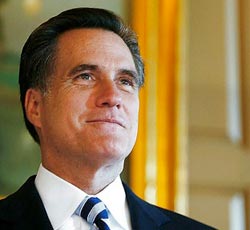Editor's Note: The article below is published as a part of a symposium hosted by Patheos' Catholic Portal and Evangelical Portal, entitled, "For Life and Family: Faith and the Future of Social Conservatism."
 Let's start with an irksome but necessary disclaimer, Mr. Chairman. I am not now nor have I ever been a member of the Church of Jesus Christ of Latter-day Saints or of any of its offshoots or permutations. I belong to the Church of Rome by way of conversion.
Let's start with an irksome but necessary disclaimer, Mr. Chairman. I am not now nor have I ever been a member of the Church of Jesus Christ of Latter-day Saints or of any of its offshoots or permutations. I belong to the Church of Rome by way of conversion.
I mention my history here only because it is highly relevant to this symposium about the future of social conservatism in America. I grew up the son of a Baptist minister and have thus observed firsthand the deep suspicions evangelicals evince toward Mormons.
If you want to see the head of a conservative Fox News-watching Protestant explode, just draw his attention to the fact that Glenn Beck is a Mormon. Be sure to stand back, well outside the blast radius.
The exact question put to the symposium was "Should traditional Christians be comfortable supporting Mormon candidates for office?" Allow me to answer the question with another one: "Why should they not be comfortable supporting Mormon candidates?" So far as I am concerned, the only legitimate answer is not a sectarian one.
There may indeed be good grounds to oppose a Mormon candidate for office. Yet they ought to be the same grounds that you would use to oppose someone from your own religious tradition. Random traditional Christian voter X should not vote for Mormon candidate Y for the same reason that he would not for a Catholic, Protestant, or Jewish candidate—because you disagree with the candidate about political matters of great import.
If you care deeply about limiting abortion, as many traditional Christians do, then you probably ought not support former House Speaker Nancy Pelosi, even if you both happen to be Catholic. Instead, you should consider supporting Jeff Flake, Rob Bishop, or Mike Crapo—Mormons legislators with solid pro-life voting records all.
When I put the case to evangelicals like that, they usually concede they can agree with most Mormons on, say, abortion, gay marriage, and the importance of family generally. But then they insist that Mormons believe "weird things" that make them suspect and probably members of a cult.
So: no sale.
Fortunately, there are a few ways to respond to this prejudicial reflex that do not involve accusations of out-and-out bigotry.
The first is to remind people that late great Francis Schaeffer developed the idea of "co-belligerency" for social conservatives of all stripes and creeds. Co-belligerency is the notion that we need not agree about philosophy, or theology, or even pray together to work together toward necessary social change.
Put more simply, if the whole point of being involved in the process is to accomplish real change—and not simply to adopt identity politics postures—then you, my socially conservative friends, are going to need multitudes of co-belligerents. You might even have to settle for allies who wear funny underwear.
Second, many of the things that you think Mormons believe, they don't. The easiest example is polygamy. The modern LDS Church prohibits polygamy and will excommunicate anyone who practices it. Using the fact that the church once practiced polygamy as a cudgel to beat modern Mormons simply won't work. Evangelicals, in the main, are rightly unwilling to attack Judaism for the polygamy of the patriarchs. The same should hold true for Mormons.
Third, we should remember that Mormonism may be the most pro-American religion there is. It was born here, after all, and has stuck around and thrived against considerable odds.
Say what you want about the religion's founder, Joseph Smith, but you cannot deny that the man was an American. No birthers here. Smith even once made a quirky third-party bid for the White House. He located the original Garden of Eden on American soil—in Missouri of all places—and Mormons commonly believe the United States Constitution to be divinely inspired.
In fact, that may be the most confounding thing about Mormons to critics of a certain cast of mind. Modern Mormons are industrious, sober, generous, and public spirited. They are model American citizens and natural social conservatives, not in spite of their religion but because of it.
5/17/2011 4:00:00 AM




